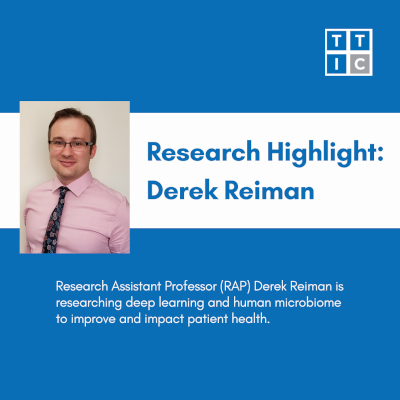
Research Highlight: Derek Reiman
After receiving his PhD from the University of Illinois, Chicago, in computational biology, Derek Reiman joined the TTIC community as a Research Assistant Professor (RAP) in fall of 2021.
Previously, Professor Reiman received his B.S. from the University of North Texas in computer science, and then worked for four years in industry in website and mobile application development.
“My PhD research was on computational biology and focused on the role of the microbiome and its role in health,” Professor Reiman said. “The microbiome is basically the community of microorganisms in an environment. You have it on all of your skin and different parts of your body. For example, your lungs have their own microbiome.”
When a child is born, the microbiome and immune system are very different from what adults have, according to Professor Reiman. The specific community is what starts to stimulate the development of an immune system, which then starts to shape the microbiome. The immune system protects the microbiome from pathogens coming in and maintains its environment, which at the same time helps develop and train the host’s immune system. The microbiome also provides metabolic functions to the body as well, so they work together synergistically.
Professor Reiman’s current research focuses on developing deep learning frameworks for multi-omics analyses of the host-microbiome interface. He studies how changes of the microbiome community impact host health through metabolic dysregulation. He is also interested in identifying the underlying interactions between the microbiome community and the host immune system.
“I focus primarily on the gut and the intestines,” Professor Reiman said. “We now know that not only are the bacteria in that environment related to metabolic functions, but also to brain development, neurological functions, metabolism, bowel disease, obesity, and they impact cancer therapy response.”
However, this importance has been acknowledged only in the more recent years. According to Professor Reiman, in the last two to three years, there have been many new discoveries of the importance of the gut and intestinal microbiome and their environment.
“I had done some work with the microbiome in my undergraduate studies, but when I started my PhD, it seemed to be a field of study that was less popular than others, such as transcriptomics or protein modeling,” Professor Reiman said. “The research community has made important discoveries that were not studied back then because no one was really interested, but it’s really interesting to me. Part of why I went back to get my PhD was because I wanted to do research that impacted patient health.”
Professor Reiman was most interested in the RAP position at TTIC because he appreciated the independence, freedom to conduct exactly what he wanted to research, and having a lot of established collaborators at TTIC and the University of Chicago.
“I’ve been working with a lot of colleagues at the University of Chicago,” Professor Reiman said. “We now study how we can manipulate the immune system and that can lead to things such as better vaccine development and understanding vaccine response.”
One of Professor Reiman’s favorite aspects of being at TTIC has been the open and collaborative environment, including in other research areas of computer science, such as Natural Language Processing (NLP) or image processing. He has also enjoyed exploring other aspects of the academia community.
“Matthew Turk, my current mentor, kind of encouraged me to look into teaching and editorialship as well,” Professor Reiman said. “I originally thought I was only going to conduct research, but because he encouraged me to look into these other things, I am also teaching along with my research and have taken up an editorship position. I think it’s been very fulfilling and I’ve also appreciated the mentorship aspect of it.”
If there is any advice that Professor Reiman would give to future RAPs, it would be to take full advantage of every talk, seminar, and workshop, including the ones that are not related to what you are researching.

